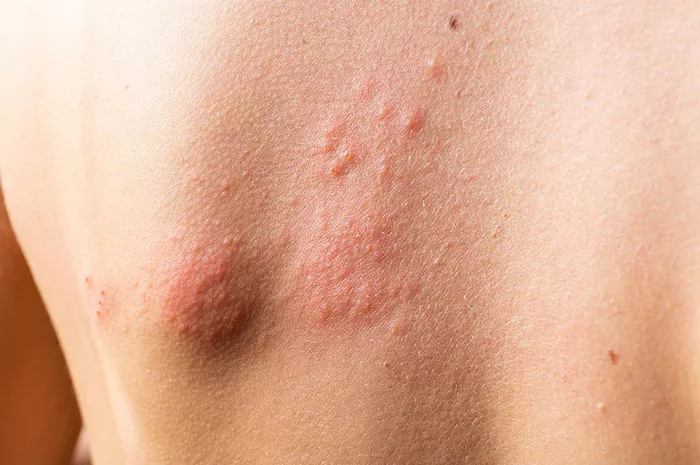Shingles, also known as herpes zoster, is a viral infection caused by the varicella-zoster virus (VZV). This virus is the same one that causes chickenpox. After a person recovers from chickenpox, the virus remains dormant in the nerve tissues near the spinal cord and brain. However, in some cases, the virus can reactivate later in life, leading to the development of shingles.
Shingles typically presents as a painful rash that develops on one side of the body, often in a band or stripe pattern. The rash is usually accompanied by itching, tingling, or burning sensations. Other common symptoms include fever, headache, and fatigue.
The varicella-zoster virus can reactivate due to various factors, including weakened immune function, stress, or aging. While anyone who has had chickenpox is at risk of developing shingles, the risk increases with age.
Risks During Pregnancy
1. To the Mother:
Shingles can pose significant risks to pregnant women, especially if they develop complications. The severity of symptoms can vary, but in some cases, shingles can cause intense pain and discomfort. Complications such as bacterial skin infections, pneumonia, or inflammation of the brain (encephalitis) may occur, particularly in individuals with weakened immune systems.
For pregnant women, the added stress on the body during pregnancy may exacerbate the symptoms of shingles. Severe pain and discomfort can interfere with daily activities and may require medical intervention to manage effectively.
2. To the Baby:
Perhaps the most concerning aspect of shingles during pregnancy is the potential impact on the developing baby. If a pregnant woman contracts shingles, there is a risk of the virus crossing the placenta and infecting the fetus. This can lead to congenital varicella syndrome, a rare but serious condition characterized by birth defects such as skin scarring, eye abnormalities, neurological problems, and developmental delays.
The risk of complications for the baby depends on various factors, including the stage of pregnancy at which the mother contracts shingles and whether she has developed immunity to the varicella-zoster virus through previous infection or vaccination.
Transmission
Shingles is contagious, but it is important to note that the virus is transmitted through direct contact with the rash or fluid from the blisters. Therefore, the risk of transmission to a developing fetus is highest if the pregnant woman has active shingles during childbirth. However, transmission of the virus to the baby in utero is rare.
Pregnant women can reduce their risk of exposure to shingles by avoiding close contact with individuals who have active shingles, particularly if they have open blisters. Additionally, practicing good hygiene, such as frequent handwashing, can help prevent the spread of the virus.
Treatment Options
Managing shingles during pregnancy requires careful consideration of the potential risks and benefits of treatment options. While antiviral medications such as acyclovir or valacyclovir are commonly used to shorten the duration and severity of shingles outbreaks in non-pregnant individuals, their safety during pregnancy is not well established.
In cases where the benefits of antiviral treatment outweigh the potential risks, healthcare providers may prescribe these medications to pregnant women with shingles. However, the decision to use antiviral therapy during pregnancy should be made on a case-by-case basis after consulting with a healthcare provider.
In addition to antiviral medications, pregnant women with shingles may require supportive care to manage symptoms such as pain and itching. Over-the-counter pain relievers, topical creams, and cool compresses can provide some relief. However, it is essential to consult with a healthcare provider before taking any medications during pregnancy.
Vaccination Information
Prevention is key when it comes to shingles, especially for pregnant women who are at increased risk of complications. The chickenpox vaccine (varicella vaccine) is recommended for individuals who have not had chickenpox or been vaccinated against it. By preventing chickenpox, the vaccine also reduces the risk of developing shingles later in life.
The shingles vaccine (zoster vaccine) is another important preventive measure, particularly for adults aged 50 and older. However, the shingles vaccine is not recommended for pregnant women due to safety concerns.
If a woman is planning to become pregnant, it is advisable to check her immunity to varicella-zoster virus through blood tests and, if necessary, receive the chickenpox vaccine before conception. Similarly, if she has not previously received the shingles vaccine and is eligible, she should consider getting vaccinated before becoming pregnant.
Seeking Medical Advice
Pregnant women who suspect they may have shingles or have been exposed to the virus should seek immediate medical attention. Early diagnosis and treatment can help reduce the risk of complications for both the mother and the baby. Healthcare providers can offer guidance on managing symptoms, minimizing the risk of transmission to others, and making informed decisions about treatment options during pregnancy.
Conclusion
In conclusion, while shingles can pose risks to pregnant women and their babies, proactive measures such as vaccination, good hygiene practices, and prompt medical attention can help mitigate these risks. By staying informed and taking appropriate precautions, pregnant women can protect their health and the health of their unborn child.
























